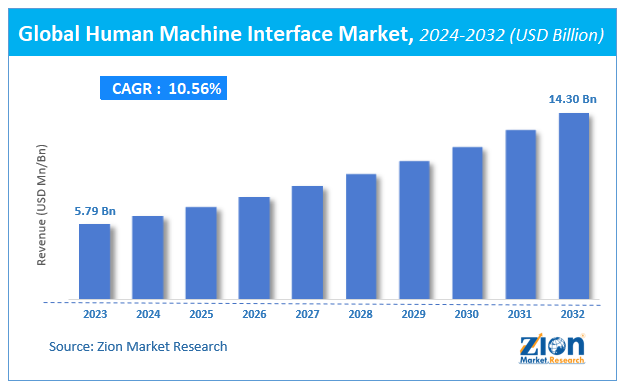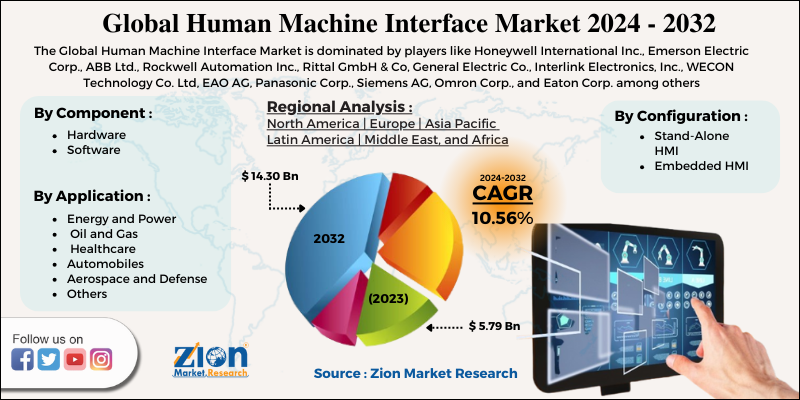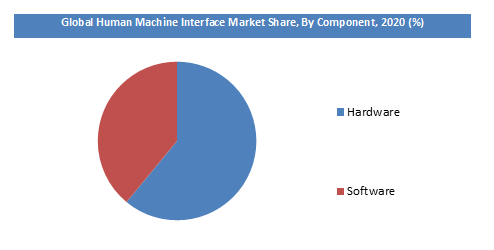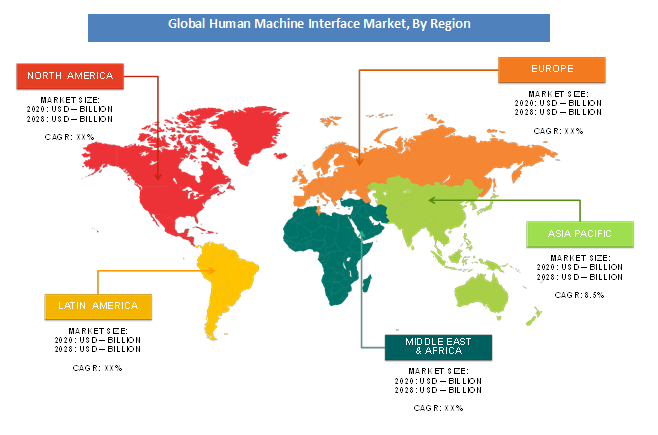Human Machine Interface Market Size, Share, Growth, Forecast 2032

Human Machine Interface Market By Component (Hardware and Software), By Configuration Type (Stand-Alone HMI and Embedded HMI), By Application (Energy and Power, Oil and Gas, Healthcare, Automobiles, Aerospace and Defense, and Others), and By Region: Global Industry Perspective, Comprehensive Analysis and Forecast, 2024 - 2032
| Market Size in 2023 | Market Forecast in 2032 | CAGR (in %) | Base Year |
|---|---|---|---|
| USD 5.79 Billion | USD 14.30 Billion | 10.56% | 2023 |
Human Machine Interface Market: Insights
Zion Market Research has published a report on the global Human Machine Interface Market, estimating its value at USD 5.79 Billion in 2023, with projections indicating that it will reach USD 14.30 Billion by 2032. The market is expected to expand at a compound annual growth rate (CAGR) of 10.56% over the forecast period 2024-2032. The report explores the factors fueling market growth, the hitches that could hamper this expansion, and the opportunities that may arise in the Human Machine Interface Market industry. Additionally, it offers a detailed analysis of how these elements will affect market demand dynamics and market performance throughout the forecast period.
Global Human Machine Interface Market: Overview
Human machine interface (HMI) is a medium for information exchange among users and electromechanical systems. Rubber keypads, touch screens, interface software, and membrane switches are some examples of HMI. Due to growth in factory automation; smartphones, tablets, and computer users; technological needs the demand for human machine interface is increasing.
Technological advancements in HMI will be likely to power the requirement of human machine interface market. For example, voice recognition, improved gesture recognition, touch screen modules, touchless sensing, augmented reality, and wearable technology are mounting productivity & safety in various sectors that are likely to fuel the growth of human machine interface market size.
Human Machine Interface Market: Growth Factors
The increasing need for reliable hardware and data security paired with strong demand for efficient & reliable software & system is enforcing to fuel the growth of human machine interface market. The increasing requirement from various sectors such as oil & gas, manufacturing, healthcare, and aerospace & defense is offering traction to the market. On the other hand, the complex designing structure and high installation cost of HMI are hindering the development of the global human machine interface market.
Moreover, new HMI solutions are pre-configured to convey info to an on-premise solution or the cloud. Hence, the rollout of IoT is altering the manufacturing factories, thereby fostering the development of human machine interface market. Moreover, increasing M&A initiatives by market players are also responsible for the development of the market. For example, in July 2017, ABB concluded the acquirement of B&R, the biggest independent operator focusing on the open-architecture and software & product-based solutions for factory & machine automation universally, fostering the market.
Human Machine Interface Market: Report Scope
| Report Attributes | Report Details |
|---|---|
| Report Name | Human Machine Interface Market |
| Market Size in 2023 | USD 5.79 Billion |
| Market Forecast in 2032 | USD 14.30 Billion |
| Growth Rate | CAGR of 10.56% |
| Number of Pages | 145 |
| Key Companies Covered | Honeywell International Inc., Emerson Electric Corp., ABB Ltd., Rockwell Automation Inc., Rittal GmbH & Co, General Electric Co., Interlink Electronics, Inc., WECON Technology Co. Ltd, EAO AG, Panasonic Corp., Siemens AG, Omron Corp., and Eaton Corp. among others. |
| Segments Covered | By Component, By Configuration Type, By Application, and By Region |
| Regions Covered | North America, Europe, Asia Pacific (APAC), Latin America, Middle East, and Africa (MEA) |
| Base Year | 2023 |
| Historical Year | 2018 to 2022 |
| Forecast Year | 2024 - 2032 |
| Customization Scope | Avail customized purchase options to meet your exact research needs. Request For Customization |
Human Machine Interface Market: Segmentation Analysis
The global human machine interface market is segmented into configuration type, component, region, and application.
By component, this market is divided into software and hardware. The hardware sector in this market will be likely to hold the biggest share in the coming years due to the rising usage of various devices for discrete applications.
Based on configuration type, the human machine interface market is divided into embedded HMI and stand-alone HMI. Due to increasing adoption of the embedded HMI solutions in process industry such as in chemical and pharmaceuticals industries is impelling the growth of hardware segment. Embedded platforms enable easy communication between two machines and provide easy access to operators, and thus help operators in process industries to gain more process visibility. Increasing demand of mobile HMI is driving the growth of the advanced panel-based human machine interface market. In addition, the advanced panel-based HMIs have high demand in industries such as oil and gas, chemical, and energy and power, where critical operations are involved.
Based on application, the human machine interface market is bifurcated into oil and gas, energy and power, automobiles, healthcare, defense, aerospace, and others. Manufacturing sectors are powering the growth of this market owing to increasing requirements to elevate the monitoring & efficiency of manufacturing plants.
Human Machine Interface Market: Regional Analysis
North America, Europe, Asia-Pacific, Latin America, and Middle East & Africa are key regional segments of the global Human Machine Interface market. Asia-Pacific is anticipated to remain the leading region over the forecast period. This is mainly attributed to the rising trend among the various industries to shift their manufacturing bases in Asia-Pacific to capitalize on the availability of skilled as well as relatively cheap labor.
In addition to this, the Asia-Pacific has transformed into a major manufacturing hub. The process and discrete manufacturing industries present in the region are progressively adopting automated technologies. The aforementioned factors significantly push the growth of the market in this region over the forecast period.
Key Market Players & Competitive Landscape
The major players operating in the Human Machine Interface market are:
- Honeywell International Inc.
- Emerson Electric Corp.
- ABB Ltd.
- Rockwell Automation Inc.
- Rittal GmbH & Co
- General Electric Co.
- Interlink Electronics, Inc.
- WECON Technology Co. Ltd
- EAO AG
- Panasonic Corp.
- Siemens AG
- Omron Corp.
- Eaton Corp. among others.
The global Human Machine Interface market is segmented as follows:
By Component
- Hardware
- Software
By Configuration Type
- Stand-Alone HMI
- Embedded HMI
By Application
- Energy and Power
- Oil and Gas
- Healthcare
- Automobiles
- Aerospace and Defense
- Others
By Region
- North America
- The U.S.
- Canada
- Europe
- France
- The UK
- Spain
- Germany
- Italy
- Rest of Europe
- Asia Pacific
- China
- Japan
- India
- South Korea
- Southeast Asia
- Rest of Asia Pacific
- Latin America
- Brazil
- Mexico
- Rest of Latin America
- Middle East & Africa
- GCC
- South Africa
- Rest of Middle East & Africa
Table Of Content
Methodology
FrequentlyAsked Questions
The global Human Machine Interface market was valued at US$ 5.79 Billion in 2023.
The global Human Machine Interface market is expected to reach US$ 5.79 Billion in 2023, set to reach US$ 14.30 B by 2032 at a CAGR of about 10.56% from 2024 to 2032.
Some of the key factors driving the global Human Machine Interface market growth are increasing need for reliable hardware and data security paired with strong demand for efficient & reliable software & system.
Asia-Pacific is anticipated to remain the leading region over the forecast period. In addition to this, the Asia-Pacific has transformed into a major manufacturing hub. The process and discrete manufacturing industries present in the region are progressively adopting automated technologies. The aforementioned factors significantly pushes growth of the market in this region over forecast period.
The major players operating in the Human Machine Interface market are Honeywell International Inc., Emerson Electric Corp., ABB Ltd., Rockwell Automation Inc., Rittal GmbH & Co, General Electric Co., Interlink Electronics, Inc., WECON Technology Co. Ltd, EAO AG, Panasonic Corp., Siemens AG, Omron Corp., and Eaton Corp among others.
RelatedNews
HappyClients
Zion Market Research
Tel: +1 (302) 444-0166
USA/Canada Toll Free No.+1 (855) 465-4651
3rd Floor,
Mrunal Paradise, Opp Maharaja Hotel,
Pimple Gurav, Pune 411061,
Maharashtra, India
Phone No +91 7768 006 007, +91 7768 006 008
US OFFICE NO +1 (302) 444-0166
US/CAN TOLL FREE +1 (855) 465-4651
Email: sales@zionmarketresearch.com
We have secured system to process your transaction.
Our support available to help you 24 hours a day, five days a week.
Monday - Friday: 9AM - 6PM
Saturday - Sunday: Closed








